Email has long been one of the most effective marketing channels for businesses of all sizes. But finding an email service provider that can keep up with the number of emails you need to send can be a challenge — especially if you don’t have much of a budget (or no budget at all).
Sending bulk emails is important to reach large audiences with your newsletters, promotional emails, and basically just communicating with your list in general. But you don’t just want to send emails without being able to understand how those emails are performing, right? That’s why we’ve put together this list of free bulk email marketing services so you can compare the features and find the right one for your business.
What Is a Bulk Email Service?
A bulk email service is an email service capable of sending emails to a large number of recipients at once. Bulk emails are generally used for advertising or marketing campaigns as well as to send out updates to your email list. The types of emails you might send include newsletters, promotional emails, transactional emails, shipping notifications, reports, password resets, and more.
You need a reliable bulk email service provider to send emails at this volume because doing it from your own email server is likely to get you flagged as a spammer. Bulk email services are specifically built with large volumes of email in mind and know how to send your emails so your sender reputation remains intact and so you don’t find yourself on the wrong side of the email gods.
Free Bulk Email Marketing Services
As we mentioned, bulk email marketing services are used to send a large volume of emails via SMTP, API, or a web interface. These tools are generally less expensive than marketing email services, but that’s because they tend to have fewer bells and whistles. Here are over 10+ free bulk email marketing services we’re loving right now.
Top
free bulk email marketing services
2024
Campaigner is a powerful tool for marketing automation and offers solutions for both email and SMS marketing. It offers a number of solutions, such as segmentation, geolocation, and localization, that let you create personalized, targeted campaigns. With Campaigner, you can build email and SMS automation workflows that can help you create more compelling campaigns.
This email marketing service also lets you nurture your contacts and turn them into loyal customers by sending customized messages that match your audience’s buying stage.
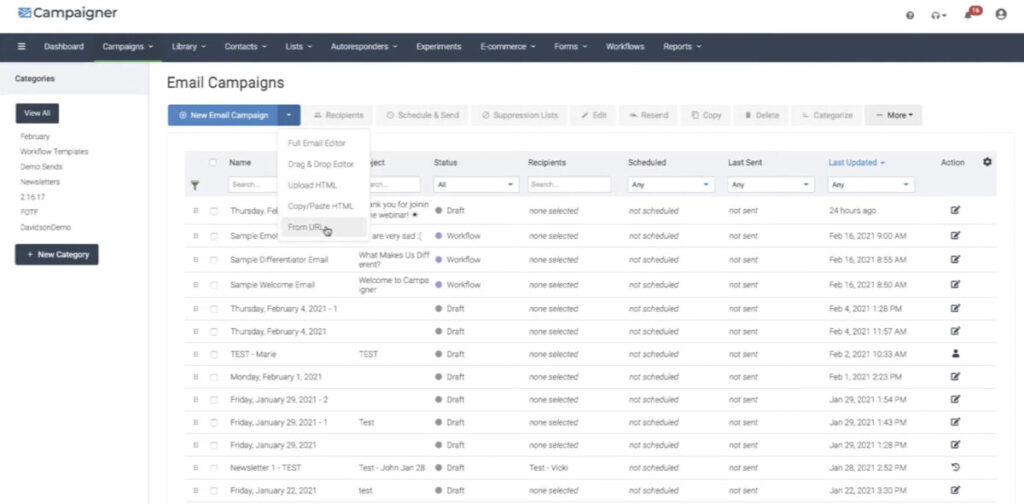

? Features
- Comes with Reputation Defender
- Drag-and-drop workflow builder
- Capability to expand marketing campaigns to include SMS
- Conversion tracking
- Multi-workflow enrollment
- Hyper-personalized messages using custom fields, geolocation, purchase behavior, localization, dynamic content, and more
- Schedule recurring campaigns
- Access to autoresponders
- Triggered campaigns
- Native integration with Shopify and Magento
- Integrates with BigCommerce and WooCommerce
- Access to an advanced template management system, a fully functional media library, and powerful image editor
- Robust reporting capabilities with contact reports, workflow reports, email campaign reports, and more
- Social sharing capabilities
- Compliance monitoring
- Subscription management
- Code editor for designing landing pages
- Contact management solutions such as suppression lists and exclusion lists
✔️ Pros and Cons
- ? Generous 30-day full-featured trial (access to over 60 advanced features)
- ? Diverse array of features for email and SMS marketing
- ? Reputation Defender feature protects you against invalid or risky contacts
- ? Easy to use
- ? No free plan
- ? You need a credit card to avail of the free trial
? Pricing
Campaigner doesn’t have a free version, but it does offer a free 30-day trial that lets you test drive its more than 60 advanced features. Pricing for Campaigner is divided into two segments:
- Starter: from $59/month
- Essential: from $179/month
- Advanced: from $649/month
- Campaigner also offers custom plans.
Email and SMS Bundle
- Starter: $104/month
- Essential: $224/month
- Advanced: $694/month
- Custom plans are also available for those that need more than 1,000 SMS sends.
Brevo is a bulk email marketing service that includes automation, email templates, and more with a drag-and-drop interface. You can use it to segment your email marketing list based on demographics and interests and use that information, along with contact information, to personalize your email marketing. We especially like the send time optimization feature (available on higher-level paid plans) that lets you send your emails at just the right time for each contact.
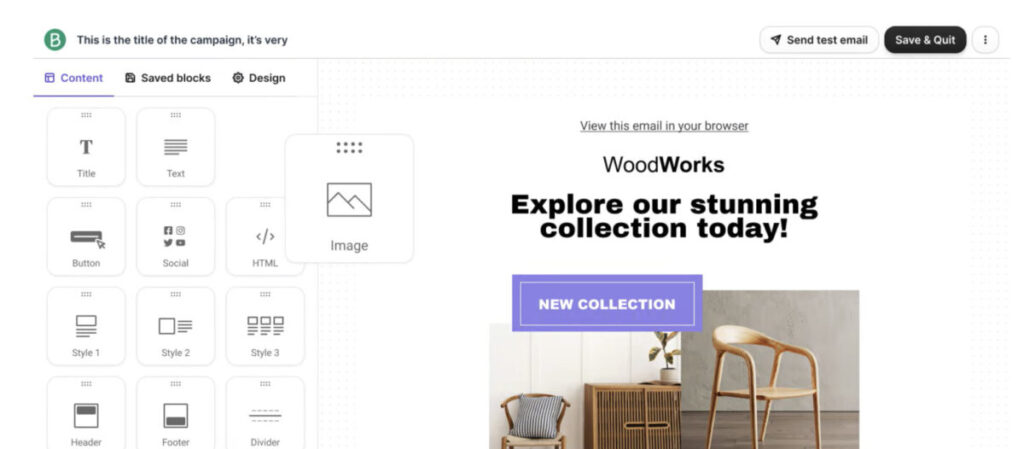

? Features
Base features:
- Email campaign designer (mobile-friendly designer)
- Email template library
- SMS marketing
- Email and SMS personalization
- Chat
Higher-level plan features:
- A/B testing
- Remove Brevo logo
- Send time optimization
- Landing page builder
- Facebook Ads
✔️ Pros and Cons
- ? Great contact management, filtering, and segmentation
- ? Modern web-tracking and lead-scoring functionality
- ? Templates are nice-looking and easy to use
- ? Transition between drag-and-drop and HTML isn’t great
- ? Might be hard to configure with dedicated IP
- ? CRM functions might be a bit limited
? Pricing
- Free plan for unlimited contacts and up to 300 email sends per day
- Starter: $25/month for up to 20,000 emails per month
- Business: $65/month for 20,000+ emails per month
- Custom pricing is available for large organizations with specific needs.
While SMTP doesn’t have a free plan, it does offer a very generous free trial of a month. It offers email delivery services at an affordable price that you can rely on, making it a must-have tool if you’ll be sending high-volume emails and a useful solution to have if you regularly need to send transactional emails.
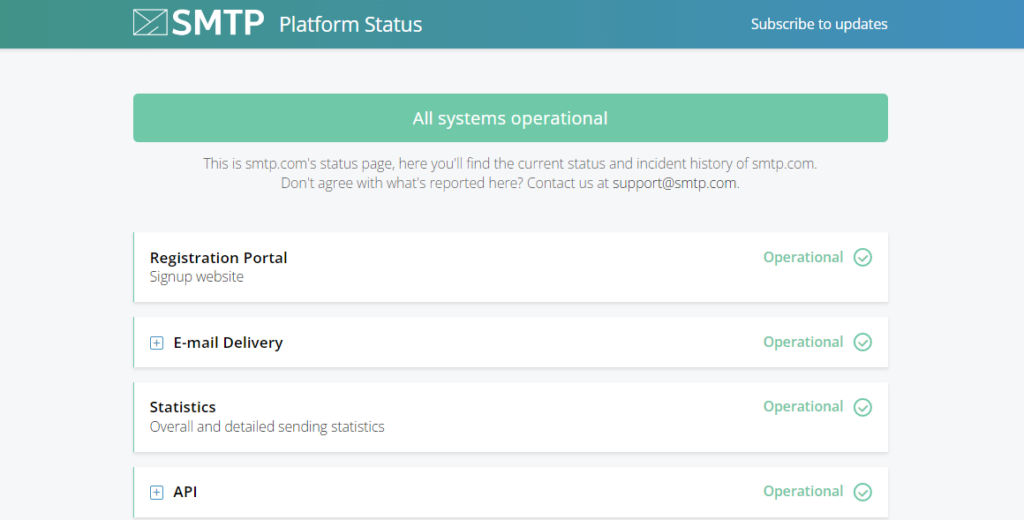

? Features
- Very fast delivery rates
- A Reputation Defender to suppress invalid email addresses
- Several transactional emails
- Email list validation
- Plug-and-play integration with marketing tools
- Detailed reporting
- Delivery consulting
- Inbox placement management
- IP reputation management
- 24/7 expert, in-house customer support
- Managed onboarding
✔️ Pros and Cons
- ? Great reputation among mailbox providers
- ? Superior inbox delivery (delivery rate of 98%)
- ? No free plan and more expensive than other tools
- ? Cheapest plan doesn’t offer a dedicated IP
- ? Some users have complained about their cancelation process
? Pricing
- Essential: $25 per month for up to 50,000 emails per month
- Starter: $80 per month for up to 100,000 emails per month
- Growth: $300 per month for up to 500,000 emails per month
- Business: $500 per month for up to 1,000,000 emails per month
- Custom pricing for businesses that need to send more than 250 million emails per month.
*It also includes an optional Reputation Defender add-on feature at 20% of the plan’s price.
Omnisend’s bulk email marketing services are perfect for eCommerce business owners and others. It includes preset automations, integrates with your shop to give you better customer targeting and key insights into shopping behavior, and offers multiple marketing channels (email, SMS, and MMS) so you can reach your customers wherever they are. Omnisend also offers a template library, automations, product analytics, and funnels with easy-to-use drag-and-drop control.
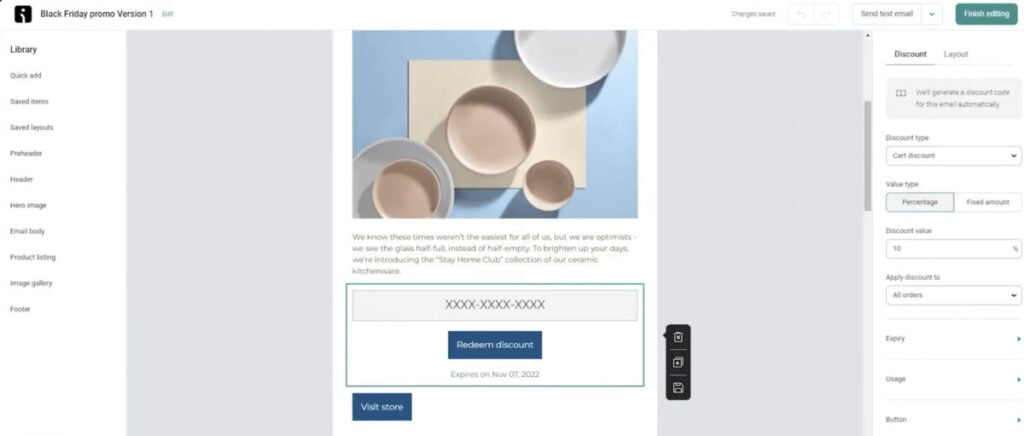

? Features
- Library of templates
- Customized emails to fit your brand — add products, dynamic discount codes, and save them as presets
- Drag-and-drop editor
- Dynamic discount codes
- Drag-and-drop workflow editing
- AI-driven customer analytics, segmentation, and insights
- Customizable, TCPA, and GDPR compliant forms and automated messages
- Aggregated sales and performance metrics as well as detailed campaign and automation reports
- Omnichannel customer experience with email, SMS, and more channels in one platform
- Migration tools
- Multi-store accounts
- Tons of integrations
✔️ Pros and Cons
- ? Product picker lets you add products to your emails easily
- ? Templates look great
- ? Great customer service
- ? Easy to track performance of newsletters and automations
- ? Can’t integrate multiple shops
- ? Monthly fees vary
- ? Email designers might find the templated system frustrating
? Pricing
- Free plan for up to 500 emails/month
- Standard: from $16/month for up to 500 contacts
- Pro: from $59/month for up to 2,500 contacts
EmailOctopus emerges as a standout choice for Free Bulk Email Marketing services, offering a blend of simplicity, efficiency, and affordability. This service is easy to use, quick to master, and powerful enough to help you grow your business. With an intuitive drag-and-drop editor for customizing email templates, this platform creates impactful email marketing campaigns without overwhelming users with complexity or cost.
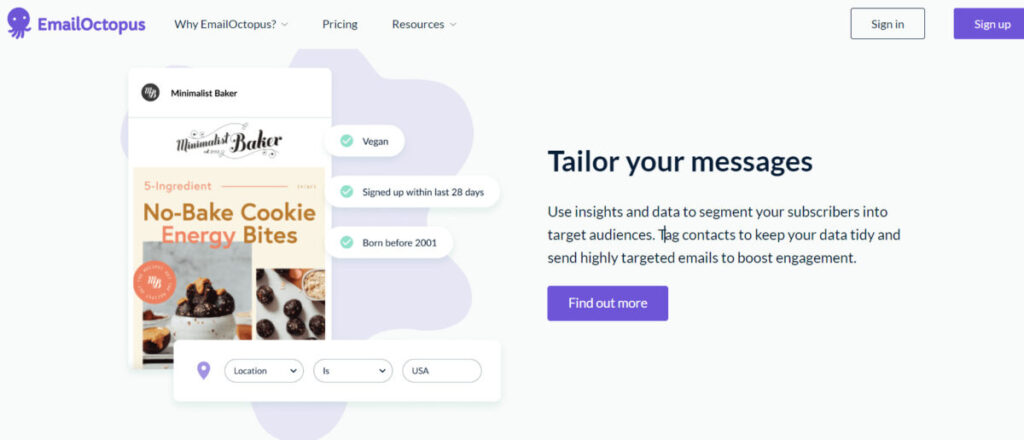

? Features
- Advanced segmentation and tags for targeted messaging.
- Customizable landing pages and web forms.
- Robust analytics and reporting tools.
- GDPR compliance.
- Integration capabilities with various apps and a developer-friendly API.
- Automation features for efficient email sequences and drip campaigns.
✔️ Pros and Cons
- ? Extensive customer base, with overwhelmingly positive reviews.
- ? Free plan available, ideal for startups and small businesses.
- ? No credit card requirement to start with the free plan.
- ? Scalable Pro plan that grows with your business, up to 500,000 subscribers.
- ? Priority support and permanent report access in Pro plan.
- ? EmailOctopus branding is present in emails on the free plan.
- ? Reports are available for only 30 days in the free plan.
? Pricing
- Free Starter Plan for 2,500 subscribers and 10,000 emails per month for one user.
- Pro: $8/month for unlimited users, 500 subscribers, and 10,000 emails. Plan scales depending on the subscriber count
- Custom: Tailored solutions for brands with over 500,000 subscribers.
Elastic Email is a free bulk email marketing service that’s easy to use. You can manage your recipient list for each marketing campaign and the platform includes autoresponders. The platform also includes web forms that you can add to your emails as well as a WordPress plugin for the WordPress users out there. Since Elastic Email offers API access, you can integrate the platform with the apps you already use. In addition, Elastic Email allows for sub-accounts and includes A/X testing features.
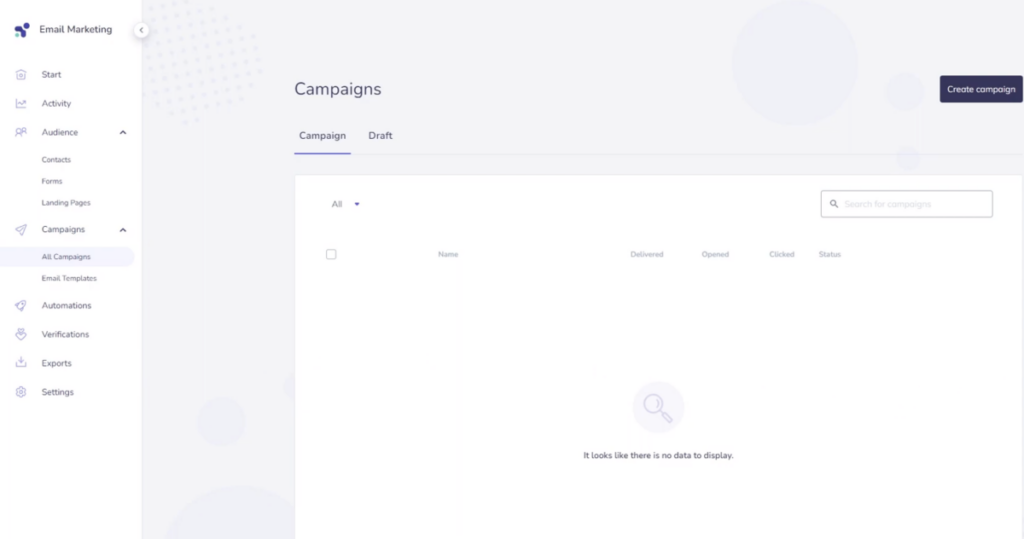

? Features
- Email designer or upload your own HTML email template
- List management
- Sending and scheduling options
- Autoresponders
- Unlimited web forms
- Subscriber form WordPress plugin
- Landing pages
- Tags and custom fields
- Segmentation functionality
- Unlimited sub-accounts
- Email automations and workflows
- Detailed reporting
- Email verification
- 24/7 support
✔️ Pros and Cons
- ? Web forms and landing pages for lead generation
- ? Less expensive than other options
- ? Tracking and dashboards have lots of info
- ? Great support
- ? Emails might end up in spam
- ? Reputation can drop quickly if you’re not using the platform correctly
- ? Some users reported that their accounts were closed for sending phishing emails
? Pricing
- Free plan allows you to send up to 100 emails per day for up to 1,000 contacts
- Starter: $9/month for up to 2,000 contacts and up to 60,000 monthly emails
- Pro: $60/month for up to 1,000 contacts and up to 300,000 monthly emails
Mailgun is another bulk email marketing service that has a robust API for sending, receiving, and tracking emails. It also offers SMTP integration for easy sending of bulk transactional emails, email validation in real-time, advanced email analytics, tracking engagement metrics, and more.
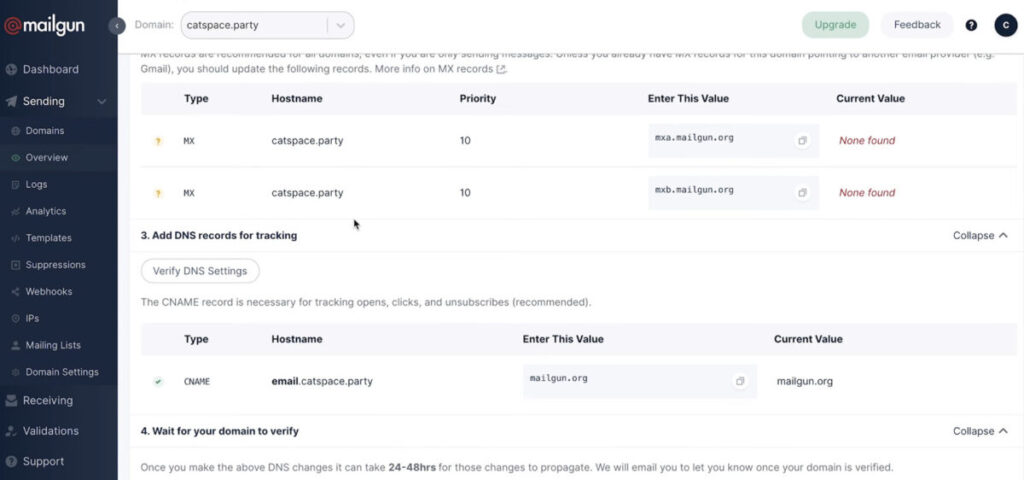

? Features
Base features:
- Email APIs, SMTP relay, and webhooks
- Suppression management
- Email tracking and analytics
- 99.99% guaranteed uptime SLA
- 5 days of log retention (30 days with Scale)
- Detailed documentation
- Limited 24/7 ticket support
Higher-level plan features:
- Inbound email routing
- 1 dedicated IP (foundation 100k and up)
- Email address validations
- Inbox placement tests
- 1-day message retention (up to 7 days with Scale)
✔️ Pros and Cons
- ? Can set up alias emails without needing to set up new email accounts
- ? Easy to set up and use in WHM
- ? Clean and useful dashboard
- ? Not the easiest interface to customize messages
- ? More expensive compared to other bulk email marketing services
- ? Some users experienced downtime of system servers
? Pricing
- Pilot: Free one-month trial which renews at $49 per month after the first month
- Foundation: $35/month for up to 50,000 monthly emails (additional emails charged at $1/1,000 emails)
- Scale: $90/month for up to 100,000 emails (additional emails charged at $0.80/1,000 emails)
Amazon SES is a bit complicated to get set up, but once that’s done, it’s an easy-to-use bulk email marketing service. It includes tons of features like tracking and mass mail. Amazon SES offers detailed reports so you can monitor the performance of your account, get anti-spam feedback, and track tons of email marketing metrics.
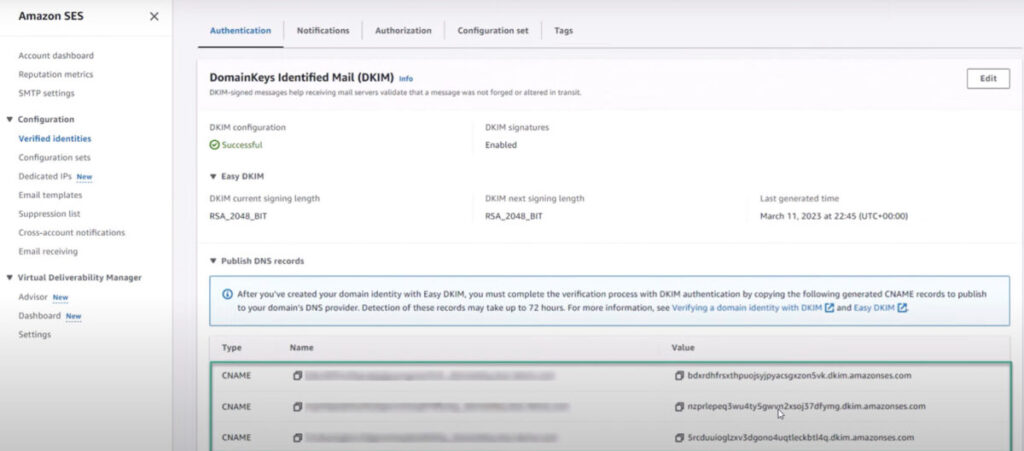

? Features
- Multiple ways to send emails — the Amazon SES console, SMTP interface, and the Amazon SES API
- Shared IP addresses are monitored to ensure high deliverability
- Users can lease dedicated IP addresses or set up dedicated IP pools
- Users can bring their own IP addresses to use with the service
- Supports all industry-standard authentication mechanisms — DKIM, SPF, and DMARC
- Access SMTP endpoint without requiring an internet gateway in a VPC
- Captures information about the entire email response funnel — numbers of sends, deliveries, opens, clicks, bounces, complaints, and rejections
- Use the Global suppression list to remove bounced emails from your sending list
- Reputation dashboard to track issues that could impact the delivery of your emails
- Use CloudWatch to create alarms that notify you when your bounce or complaint rates reach certain thresholds
- Deliverability Dashboard helps you understand and remediate issues that could impact the delivery of your emails (like suboptimal email content)
- Accept or reject email based on the email address, IP address, or domain of the sender
- Mailbox simulator to test how your application handles certain scenarios (like bounces or complaints) without impacting your sender reputation
✔️ Pros and Cons
- ? First 62,000 emails are free to send
- ? Has great deliverability
- ? Easy to use after initial setup
- ? Support is slow
- ? Configuration settings are complicated
? Pricing
- First 62,000 emails are free to send from applications hosted in EC2
- Sending email from an email client or other software package: $0.10/1,000 emails + $0.12/GB of attachments
- Receiving email: $0 for the first 1,000 emails you receive, $0.10 for every 1,000 emails you receive after that + $0.09 for every 1,000 incoming email chunks
SendPulse is less a bulk email marketing service and more of an all-in-one communication platform. It lands on our list because it also includes a bulk email sender tool. SendPulse’s free bulk email sender includes automated chatbot campaigns and push notifications. The platform has free email templates, event-triggered emails, and more.
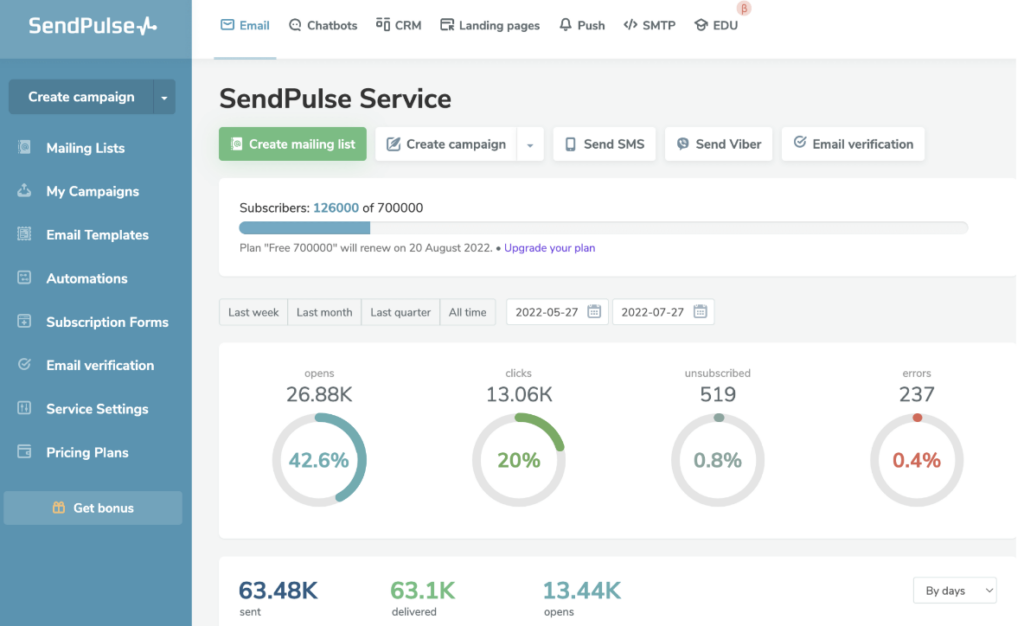

? Features
- Resend to unopened with a new subject line
- Segment recipients based on interests and demographics
- A/B testing
- Set user access levels
- Integrate with your CRM or CMS
- Mobile app
✔️ Pros and Cons
- ? Analytics are good
- ? Easy to use
- ? Nice backend site
- ? Filters are quite finicky
- ? Support isn’t great
? Pricing
- Free plan for up to 500 subscribers and 15,000 emails per month
- Standard: $8/month for up to 500 subscribers and an unlimited number of emails
- Pro: $9.60/month for up to 500 subscribers and an unlimited number of emails
- Enterprise: $13.44/month for up to 500 subscribers and an unlimited number of emails
Sender is another of our favorite free bulk email marketing services that also has great paid plans, too. With Sender, you can send emails using customizable templates or use the drag-and-drop building to create your own newsletters and emails. There’s also a custom HTML editor for coding your own email templates.
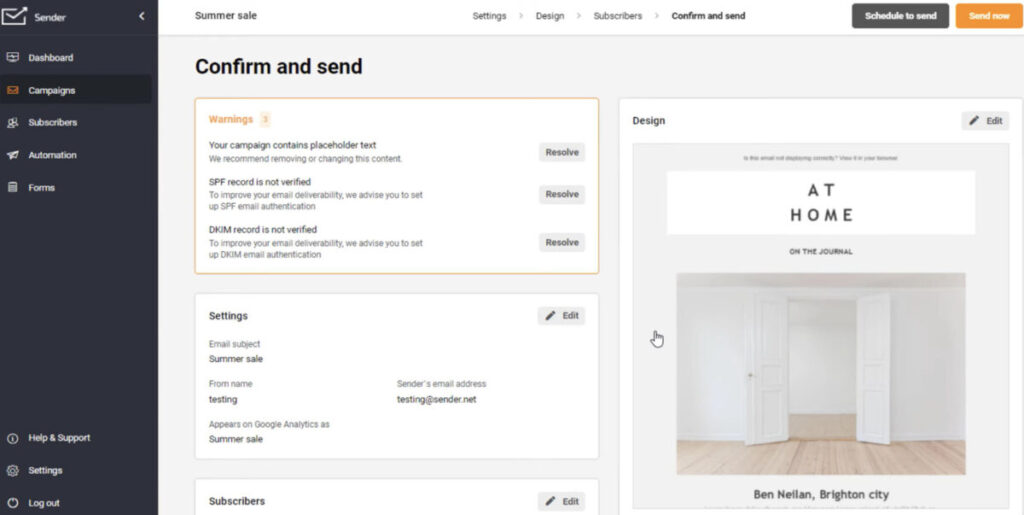

? Features
- High email deliverability
- Smart automations
- Library of templates to choose from (or build your own)
- Personalize your messages
- Advanced analytics tools
- Advanced email delivery infrastructure
- Plugins for popular content management systems (CMS) like WordPress, WooCommerce, PrestaShop, and more
- Landing pages
- SMS marketing
- Push notifications
✔️ Pros and Cons
- ? Support is great
- ? Strong deliverability
- ? No image library to store used images
- ? Can be difficult to navigate
? Pricing
- Free plan for up to 2,500 subscribers and 15,000 emails/month
- Standard: starts at $19/month for up to 30,000 emails/month
- Professional: starts at $35/month for up to 60,000 emails/month
- Custom pricing is also available for large businesses.
MailerLite is one of the free bulk email marketing services on our list that is great for beginners. It has drag-and-drop functionality that makes it really easy to create awesome newsletters as well as an easy way for eCommerce businesses to add product listings. With the bulk email sender, you can send automated emails and even make certain sections of your newsletters visible only to certain subscribers. This is called dynamic content and is absolutely great for providing relevant information to your segments without having to create an entirely separate email for each of those segments.
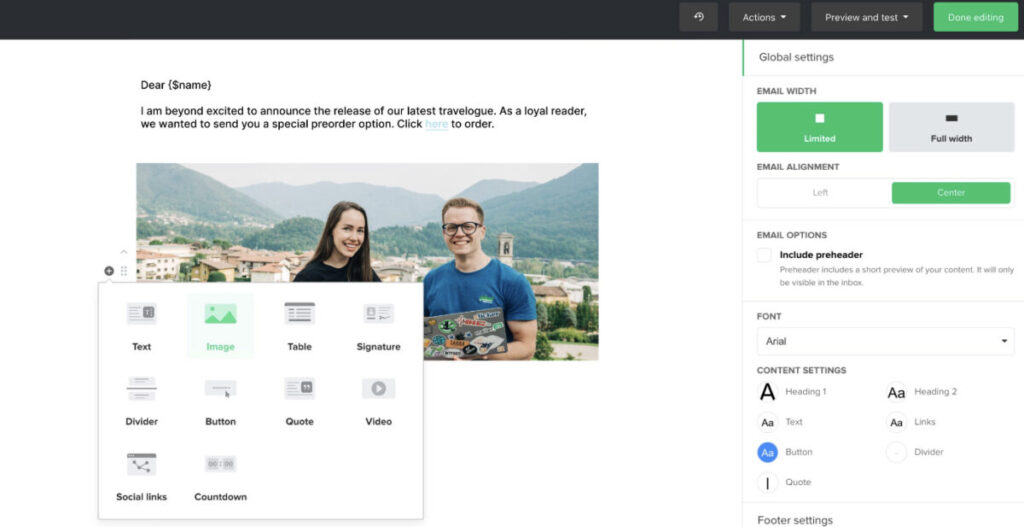

? Features
- Create your emails from templates, a custom HTML editor, rich text editor, or the drag-and-drop tool
- Built-in photo editor
- Includes a website builder, landing pages, popups, and embedded forms
- Subscriber management
- Advanced targeting features
- Email automation
- Personalization and segmentation
- A/B split testing
- Deliver by time zone
- Auto resend
- RSS campaigns
- Tracking and analytics including campaign reports, surveys, click maps, and opens by location
✔️ Pros and Cons
- ? Free plan includes automation features
- ? Easy to use
- ? Landing page editor
- ? No CRM features
- ? Limited reporting
- ? No advanced automations
? Pricing
- Free for up to 1,000 subscribers and up to 12,000 emails per month
- Growing: $10 per month for up to 500 subscribers and unlimited monthly emails
- Advanced: $20 per month for up to 500 subscribers and unlimited monthly emails
Mailjet is a bulk email marketing service that supports real-time collaboration between team members. You can use the drag-and-drop editor to create great email layouts, add image and text blocks, and even buttons for social media sharing. Mailjet also has subscription forms to help you grow your email list as well as an SMTP server and quite extensive documentation.
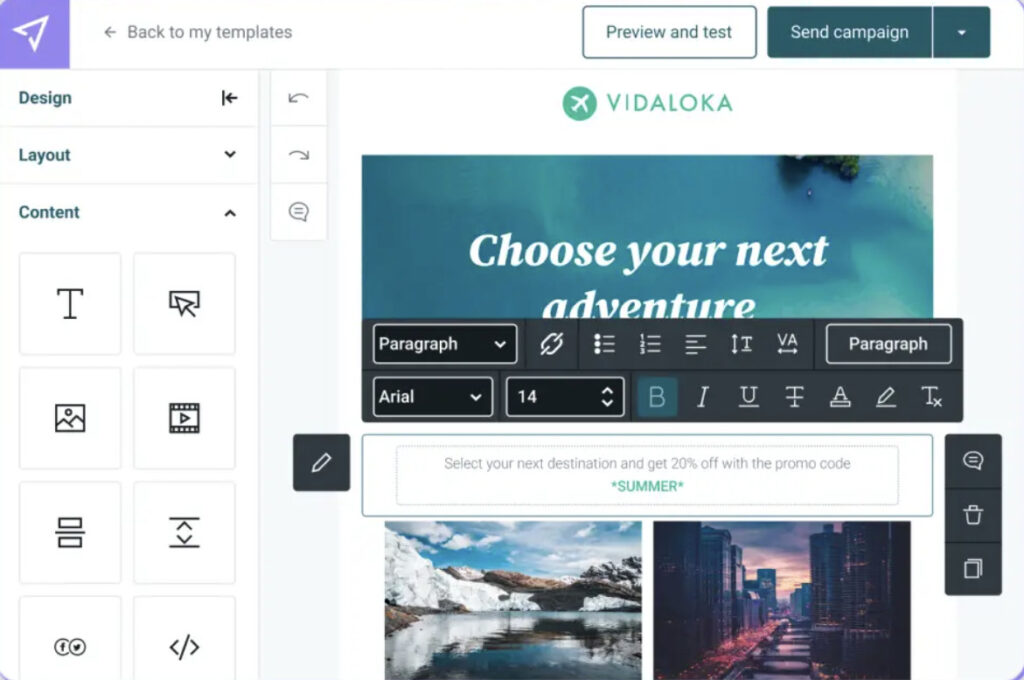

? Features
- Intuitive drag-and-drop editor
- Responsive email newsletter templates
- Real-time team collaboration
- Inbox Preview tool, so you can see exactly how your email will display
- Native WordPress plugin
- A/B testing tool
- Marketing automation tools
- Advanced statistics
- Integrate Mailgun to schedule, send, and track emails using SMTP server or RESTful API
- Subscription forms
- Contact management to organize and segment subscribers
✔️ Pros and Cons
- ? Great deliverability reputation
- ? Easy to configure website to send emails from there
- ? Useful dashboard and reporting
- ? Customer service doesn’t exactly “wow” users
- ? System sometimes lags
- ? Lack of re-engagement campaign functionality
? Pricing
- Free plan for 200 emails/day (6,000/month)
- Essential: $15/month for unlimited contacts and up to 15,000 monthly emails
- Premium: $25/month for unlimited contacts and up to 15,000 monthly emails
- Custom pricing is also available upon request.
Mailchimp is one of the more popular bulk email marketing services on our list. It offers inbuilt marketing tools, a bulk email verifier, and custom domains for increasing sales. You’ll also be able to use Mailchimp to create and share social ads, emails, landing pages, and even postcards (yep, actual postcards). Mailchimp has behavioral targeting and predicted demographics features to help you reach the right people at the right time as well as a subject line helper, real-time marketing automation, and A/B testing.
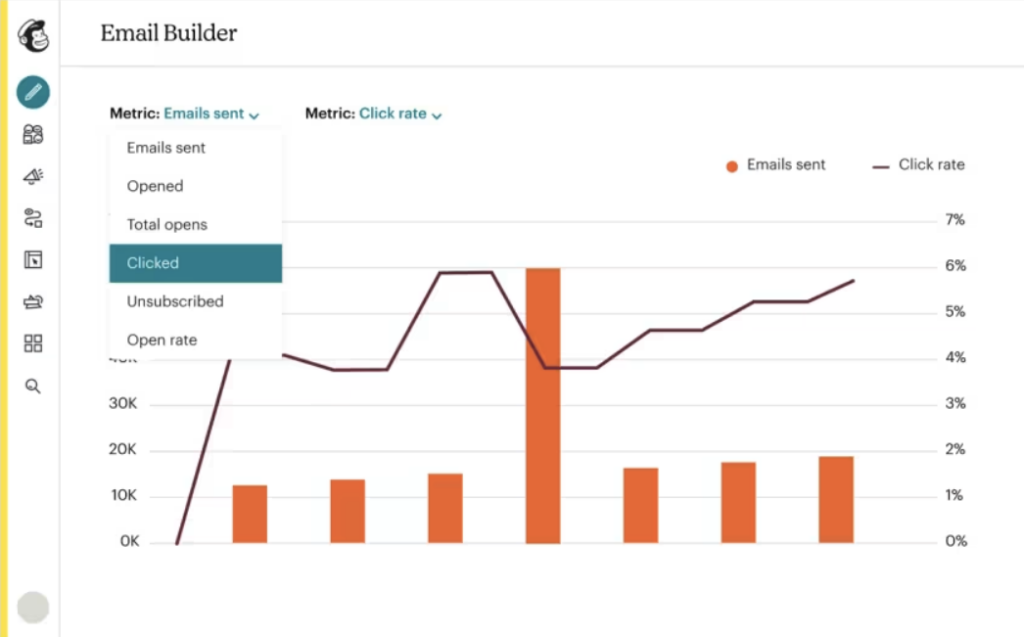

? Features
- Build a website with a custom domain
- Signup forms, landing pages, social posts and ads, and a lookalike audience finder
- Customer dashboards
- Segmentation tools
- Integrates with the tools you probably already use
- Pre-built segments, tags, behavioral targeting, and predicted demographics
- Award-winning support
✔️ Pros and Cons
- ? Thorough reporting tools
- ? Simple and easy-to-use email editor
- ? Includes an online store builder (US and UK users)
- ? Plans can get expensive, fast
? Pricing
- Free plan for up to 500 subscribers
- Essentials: from $13/month for up to 500 contacts and 5,000 monthly email sends
- Standard: from $20/month for up to 500 contacts and 6,000 monthly email sends
- Premium: from $350/month for up to 10,000 contacts and 150,000 monthly email sends
What to Look for in a Bulk Email Service
There are a few key features that you’ll want to look for in a bulk email service before committing:
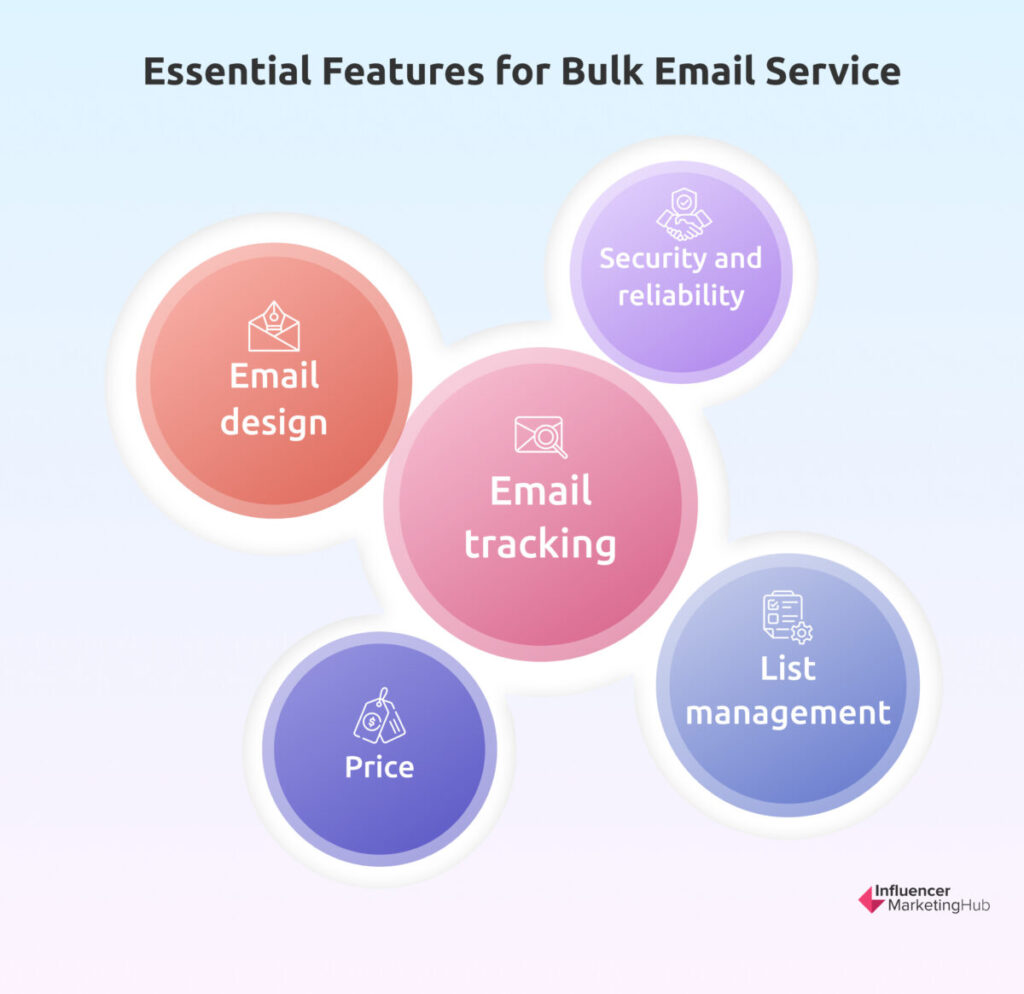

Security and reliability
Security and reliability are hands down the most important feature to look for in your bulk email service. Double-check the tool’s delivery rate. In short, it refers to the rate at which your emails make it safely to the inbox. Most publish it as a percentage on their website. Anything above 90%, ideally 95%, is seen as excellent. If it’s about the mid 80s, it’s still acceptable.
When you’re sending out a large volume of emails in a short amount of time, you need to be able to do it without triggering any spam filters. You also don’t want all the hours that you’ve poured into your email marketing campaigns to go to waste. Your bulk email provider should give you the option to choose an SMTP server and use batching (sending emails out in smaller batches) to send out your bulk emails instead of sending them out all at once.
SendGrid by Twillio is a tool that shines in this department, for example. Rated as one of the best SMTP service software, it’s known specifically for its SMTP bulk email marketing feature.
Email tracking
Most bulk email services will give you at least some basic email tracking tools so you can check open and click rates, deliverability, and other common email marketing benchmarks and metrics.
Some of the more powerful tools will offer in-depth analytics. Tools like Mailchimp and SendPulse, in particular, are great when it comes to analytics. For example, with Mailchimp you simply enable tracking and you’ll get automated campaign reports giving you insight into your monthly performance. Alternatively, it also gives you the freedom to zoom in on analytics for individual emails.
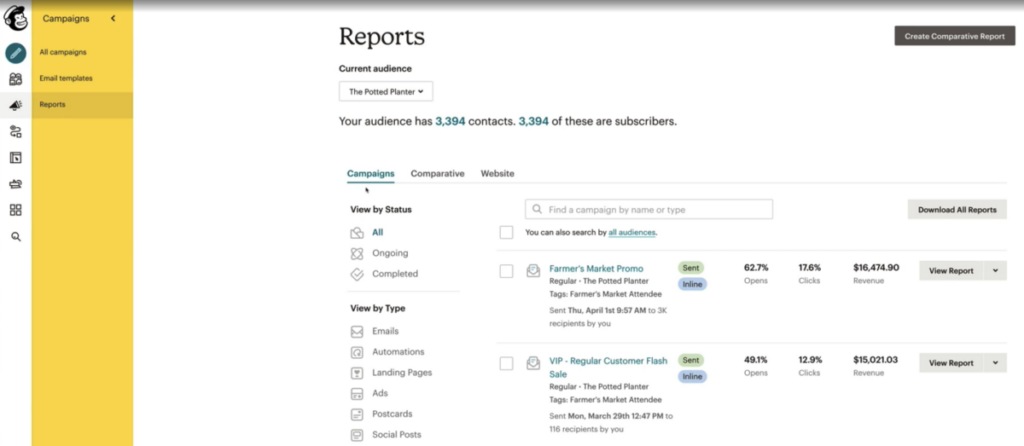

Source: mailchimp.com
List management
The bulk email service you choose should give you the option to add and manage your email marketing list. This includes features that will help you segment your list and keep your list clean and free from duplicates and inactive emails.
Segmentation is foundational for personalization. Using identifying factors like age and gender as well as criteria relating to shopping behavior such as purchase history, you can group subscribers together helping you to tailor your content to meet their interests and needs.
Once again, Mailchimp is pretty solid when it comes to list management. As it’s also rated as one of the best campaign management software, it can help with much more than just email list management. To keep your email list healthy specifically, you can use features like tags for groups of contacts and then you can use the tag data to create segments.
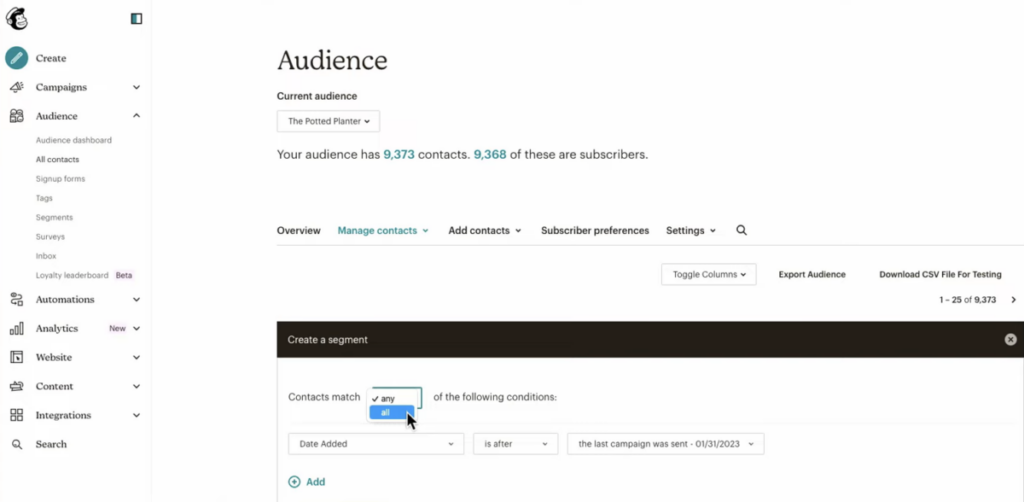

Source: youtube.com
In addition to segmentation, your tool should also make it easy to remove inactive emails or duplicates. Heavy email users should do this every few months.
Removing unengaged subscribers can help you to dodge the Spam folder. Tools like SendGrid and MailerLite are two examples that make light work of cleaning up inactive subscribers. For example, with MailerLite you can use search filters to remove subscribers that have been inactive for a specific period to help you keep only the highly engaged ones.
Email design
Typically, a bulk email service isn’t going to include as many design options as the average email marketing service provider, but it should include at least some basic design tools. If there aren’t any design tools available, the platform should at least give you the option to import your own design or paste an HTML email template.
Ideally, the tool should have drag-and-drop functionality (which most of them do). This just makes your life much easier.
Also, look at the selection of responsive templates available. The emphasis here is on responsiveness. According to email marketing stats, mobile devices are the most popular medium to catch up on your email. Double-check that the email design is geared towards mobile devices.
Price
Cost is going to be a factor for some businesses. On our list, we’ve included free bulk email marketing services that include additional features and functionality on their paid plans. No matter your budget, you’ll be able to find a bulk email marketing service for you on this list.
That said, some of the features that we’ve highlighted are only available in the paid plans. Also, with some tools like Mailchimp, it can become pretty expensive pretty quickly. So, while you might be able to make do with the entry-level plan for now, do yourself a favor and check what the other plans cost as well. You don’t want to find yourself in a situation down the line that you’ve become familiar with a tool only to realize that you won’t be able to afford it should you require more functionality.
Best Practices for Using Free Bulk Email Services
Combine these tips for effective email campaign management and avoid the following common pitfalls to ensure your new bulk email service delivers.
Warm up your IP
This is not so much a best practice, but a rule. If you plan on sending emails in bulk using a dedicated IP address, you first need to warm it up.
The IP warm-up process is quite technical, but you can use tools like Mailgun to do it automatically. Basically, it’s about improving your reputation to avoid slow delivery speed or, worse, getting blacklisted.
Get consent first and only email to your subscribers
You first need to get your contacts’ permission before you can send them marketing emails. In many countries, it’s actually required by law. That said, even if it’s not a legal requirement, it’s simply good marketing etiquette.
The easiest way to do this is to ask them to subscribe to your email list (specifically mentioning that it will be for promotion emails). For example, if you’re running an eCommerce website, you can add a popup where they can tick to opt-in to marketing emails upon checkout.
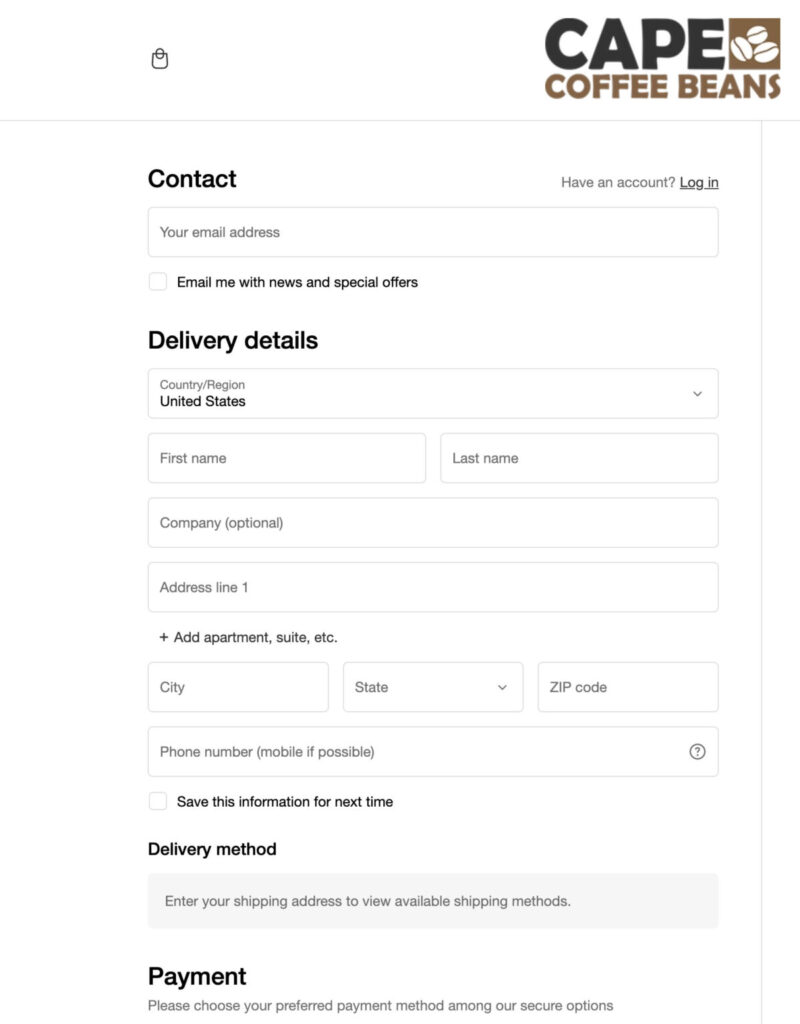

Source: capecoffeebeans.co.za
Building your email list like this will take time, but that’s the way to do it. Shortcuts like buying contact lists is a big no-no. Even if the subscribers on that list check out, it’s not to say that they form part of the audience that you’re targeting, rendering the list and your email efforts useless.
Personalize the content
For email marketing to be effective, the content that you send should be relevant to your subscribers. If they care about the topic, chances are that they’ll read it. Why else will they want to open the email? You’ve gone to great lengths to segment your list. All this effort will be useless if you don’t adjust your content accordingly.
Aside from relevancy, get the basics right too. The content, especially the subject line, should be correct. Content that’s misleading or false goes against spam rules. After all, it’s also the credibility of your brand that’s on the line. Do you really want to be connected to spammy subject lines?
Set an email schedule
Consistency is key, whether you’re using email or social media for sharing your content. Aside from keeping your content flow consistent, an email schedule will also help you to find the right frequency. Basically, you need to find the right balance between being guilty of information overload and being forgotten.
Include your details
Countries also have rules regarding spam that you need to keep in mind. According to the CAN-SPAM act, you must ensure that bulk emails also include identifying details about the sender.
Rule or not, it’s good business practice. Including your name creates credibility and trust. You can also create your email templates in such a way that it includes the name of your business along with its contact details like a phone number and/or address.
Add an unsubscribe button
Just like you’re required by law to get consent first, it’s also a legal requirement to include an unsubscribe button. This will only apply to promotional emails, though. Subscribers can’t unsubscribe from transactional emails like order confirmations and policy updates.
Rather have recipients unsubscribe than having them mark your emails as spam. You also don’t want your business to become known as that unwelcome visitor who won’t leave.
Optimize for mobile devices
According to email marketing trends and stats, over 80% of emails are opened on mobile devices. The message is clear — design and write with mobile devices in mind.
Basically, shorter and bigger are better. Keep your subject lines and copy short and use bigger images and font sizes.
What Is the Best Way to Send Personalized Bulk Email
As mentioned earlier, email personalization is essential. Just because you’re sending email in bulk doesn’t mean that you have to send the same message to everyone.
The best way to personalize bulk email is with the help of software. Pick an email service provider that lets you segment your list.
You’ll also need data to know how to group your contacts. Popular criteria to use include location, gender, age, and metrics like open rate. So, check that the tool that you want to use offers different types of data.
Once you have your groups, your next step will be to create templates for each group. For this step, a tool that offers features like drag-and-drop functionality as well as a content library will make the job much easier.
It’s not only about the content of a specific email, but also about what comes next. Creating an automated customer journey will make the whole experience more relevant.
Ease of Integration: Ensuring Your Bulk Email Service Works With Your Tech Stack
A Gartner survey found that marketers use only 42% of the capabilities of their martech stack. The three main reasons for this is an overlap among marketing tech solutions, difficulty finding talent to adopt and use it, and the complexity of the marketing tech ecosystem. This underscores the importance of finding a software that “plays nicely” with your other tools.
When it comes to email services, the other tools that you’ll most likely want to use with your bulk email service include a customer relationship management (CRM) system, an eCommerce platform, a survey creator, and a reporting tool. If the email service seamlessly integrates with these systems, you’ll boost the overall effectiveness of your campaigns.
For example, if you can integrate a CRM with your email service, you can streamline the process of collecting contact details. What’s more, you’ll get access to customer data regarding interactions, making it easier to segment and personalize. Plus, if the tool also integrates with your eCommerce platform, you’ll be able to use customer behavior, like a recent purchase, to automate email campaigns sharing product recommendations.
Choose From the Best Free Bulk Email Marketing Services
Each of the free bulk email marketing services on our list will meet your needs. The tool you choose will depend on various factors like your budget, the features you need, and who is going to be using the tool in your business (developers will gravitate towards a different tool than bloggers, for example). As long as the bulk email marketing service you choose is reliable and has good deliverability, you’ll see improvements in your email marketing strategy and be able to meet your marketing goals.
Frequently Asked Questions
What is bulk emailing?
Bulk emailing is the process of sending a large volume of emails at once. This should happen with the aid of one of the free bulk email marketing services on our list in order to reduce time, cost, and improve deliverability. You should not use your own email service to send large quantities of emails.
How do I send bulk emails?
Sending bulk emails is easy when you have the right bulk email marketing service to help you. With most of the tools on our list, you just prepare your email, choose the segments you want to send it to, and either schedule your email or click send. It’s as easy as that.
What are the best free bulk email marketing services?
We’ve included 13 of the best free bulk email marketing services on our list:
- Campaigner
- Brevo
- SMTP
- Omnisend
- EmailOctopus
- Elastic Email
- Mailgun
- Amazon SES
- SendPulse
- Sender
- MailerLite
- Mailjet
- Mailchimp
In addition to the free bulk email marketing services we’ve featured here, there are several other bulk email marketing services to choose from:
- ActiveCampaign
- Constant Contact
- Moosend
- ConvertKit
- SendGrid
- Drip
- GetResponse
What is a bulk email service?
A bulk email marketing service makes it easy for users to send the same email to thousands of recipients at the same time instead of manually sending emails to every person on your email list. Many of these services offer features that allow users to create customized and personalized emails using HTML email templates, templates, or drag-and-drop email builders. These tools can provide high deliverability because they’ve been built to send this type of email communication and understand how to send the emails without running afoul of spamming rules.
Is it legal to send bulk emails?
Yes, sending bulk emails is perfectly legal but there are some laws around email marketing that email marketers should be aware of. Laws can vary from country to country, so it’s important to check the email marketing laws in place in both your country and those to which you’re sending emails. For example, there’s the CAN-SPAM Act in the United States, CASL laws in Canada, and the UK has electronic communication regulations. Best practices are to always have permission to email the people on your list, be honest in your communications, and always provide an option for users to unsubscribe from your list.


![13 Free Bulk Email Marketing Services for 2024 [Compared & Rated]](https://hustlersdailypay.com/wp-content/uploads/2024/02/Free-Bulk-Email-Marketing-Services-768x402.jpeg)